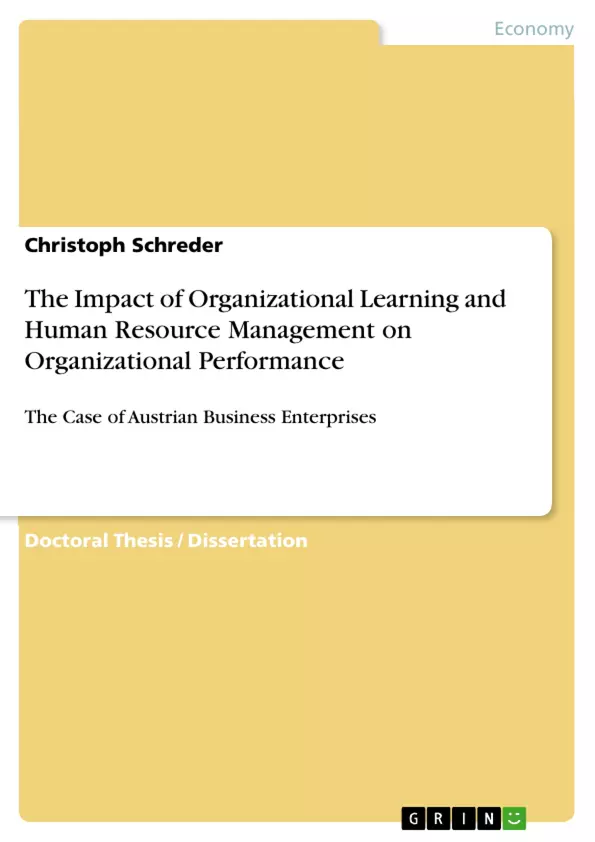The purpose of this dissertation is to develop a model of the linkages between human resource management, organizational learning and organizational performance to test the assumptions and to analyze the correlations in order to substantiate or falsify the original model and to draw respective conclusions for relevant stakeholders in business enterprises as well as to give suggestions for further research in the field.
The research hypotheses that organizational learning positively influences organizational performance et vice versa, and that human resource management positively influences organizational performance directly are developed and the research model is conceptualized, operationalized, and visualized via the resulting theoretical scheme. Also, the development of the research methodology, design, and the selection of research methods is being undertaken, and the data gathering process via pre-study and electronic survey about the interdependencies between the theoretical constructs involved in the research hypotheses are described. The data analysis on the electronic survey about the items influencing the interdependencies between theoretical constructs of human resource management, organizational learning, and organizational performance takes place starting with a factor analysis and based on it the research scheme is being adapted into an evidence-based research model which is analyzed via different descriptive statistical methods, i.e. hierarchical and multiple regression analysis, and Structural Equation Modelling. The practical implementation of research suggestions in Austrian business enterprises is discussed by ways of the best-practice-example of an international business enterprise in the sector of industry.
Main conclusions include that: organizational performance cannot be seen as a holistic concept incorporating the end results of all the organization’s work processes and activities directed at lasting competitive advantage, but has to be divided into two separated concepts. The main hypothesis that organizational learning positively influences organizational performance in terms of non-financial variables regarding general competitiveness and human resource performance also can be substantiated.
Human resource managers can use the findings as reference for future strategic orientation of organizations as well as derive specific implementation measures from it.
Table of Contents
- Introduction
- Conceptual framework of interdependecies between organizational learning, human resource management and organizational performance
- Main approaches to the relationship between organizational learning, human resource management and organizational performance
- Definition of main theoretical concepts
- Open questions in existing literature as starting points for further research
- Research methodology for testing the interdependencies between human resource management, organizational learning, and organizational performance.
- Research hypotheses about the connection between organizational learning, human resource management and organizational performance
- Dimensions of the research model and measurement of organizational learning, human resource management, and organizational performance
- Target population and sampling approach to research on the linkage between organizational learning, human resource management, and organizational performance
- Approach to reliability and validity in the conducted research
- Theoretical scheme of the presupposed connex between organizational learning, human resource management, and organizational performance
- Measurement model of the connex between organizational learning, human resource management, and organizational performance
- Research roadmap: the development of the research scheme and evidence based adaptation
- Approach to research evaluation
- Quantitative and qualitative analysis of the relationship between organizational learning and human resource management on organizational performance
- Impact of organizational learning and human resource management on organizational performance: partial factor analysis
- Modified evidence-based research model
- Factor scores' Pearson correlation and linear regression
- Testing interdependencies as basis for confirmation or disconfirmation of the hypotheses: regression analysis
- Testing interdependencies via Structural Equation Modeling
- The findings of the research
- Best-practice-example of practical implementation of research in Austrian companies
- Conclusions and suggestions
Objectives and Key Themes
This doctoral thesis examines the impact of organizational learning and human resource management on organizational performance in Austrian businesses. It aims to establish a comprehensive understanding of the interdependencies between these three elements and to develop a robust research model that can be used to analyze and predict organizational performance.
- Interdependencies between organizational learning, human resource management, and organizational performance
- Development and validation of a research model to analyze these interdependencies
- Quantitative and qualitative analysis of the relationship between organizational learning and human resource management on organizational performance
- Practical implications and best practices for Austrian businesses
- Contributions to the existing body of knowledge on organizational learning, human resource management, and organizational performance
Chapter Summaries
The thesis begins with an introduction outlining the research problem and its relevance. Chapter 1 explores existing theoretical frameworks and definitions related to organizational learning, human resource management, and organizational performance, highlighting key gaps in the current literature. Chapter 2 delves into the research methodology, establishing hypotheses and outlining the research model, sample selection, data collection, and analysis methods. Chapter 3 presents the results of the quantitative and qualitative analysis of the relationship between organizational learning and human resource management on organizational performance. It includes factor analysis, regression analysis, and structural equation modeling to assess the proposed relationships. Chapter 4 examines a best-practice example of practical implementation of the research findings in an Austrian company, providing valuable insights for practitioners.
Keywords
The thesis focuses on organizational learning, human resource management, organizational performance, interdependencies, research model, Austrian businesses, quantitative and qualitative analysis, factor analysis, regression analysis, structural equation modeling, practical implementation, and best practices.
- Quote paper
- Dr. Christoph Schreder (Author), 2019, The Impact of Organizational Learning and Human Resource Management on Organizational Performance, Munich, GRIN Verlag, https://www.grin.com/document/961354



